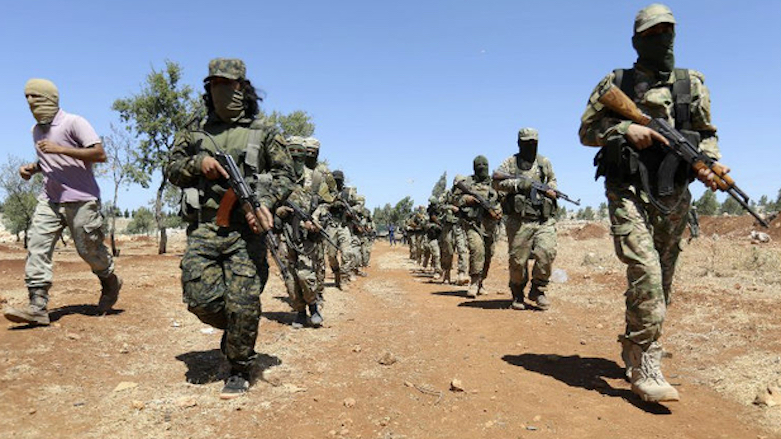Al-Qaida-linked group’s seizure of Idlib puts pressure on Turkish-Russian deal
The development could end the de-escalation deal between Russia and Turkey on Idlib which has prevented a Syrian regime offensive on the province.

ERBIL (Kurdistan 24) – Hay’at Tahrir al-Sham (HTS), which the United States links to al-Qaida, has taken full control of Idlib. The development could end the de-escalation deal between Russia and Turkey on Idlib which has prevented a Syrian regime offensive on the province.
Both the HTS and the Turkish-backed National Liberation Front (NLF) agreed on Thursday to hand over Idlib to the HTS-affiliated Government of Salvation, the news website Syria Call reported.
The HTS took full control after clashes with Turkish-backed groups that erupted in early January.
The National Liberation Front surrenders the civilian administration of rebel-held Idlib & surrounding areas to HTS' "Salvation Government." Areas under NLF control were previously self-governed/supported by the mainstream Syrian Interim Government https://t.co/9pjMBJGNqE pic.twitter.com/jV06Wjy1TN
— Elizabeth Tsurkov (@Elizrael) January 10, 2019
“HTS controls all of Idlib. It is a black day,” Mahmoud Abbi stated. Abbi was the spokesperson of the Free Idlib Police, which dissolved itself after the HTS-NLF agreement.
Abbi said he fears for civilians in Idlib who are now under risk of possible attacks. “The fate of Idlib is black. I think Idlib will be bombed by Assad-Russian warplanes,” he added.
Turkey set up several army observation points in Idlib early last year as part of a de-confliction deal with Russia.
According to Syria call, fighters that did not accept the deal were moved toward Turkish-occupied Afrin, which could lead to more demographic changes in the Kurdish-majority region.
Idlib, a strategic governorate that borders Turkey and hosts over two million people, is the last major territory still in militant hands, apart from land held under the Turkish-backed groups in northern Syria.
Elizabeth Tsurkov, a Research Fellow at the Forum for Regional Thinking, who specializes in Syria, said civilians in Idlib are frightened of a possible regime offensive after the HTS violated the Astana deal.
“They [civilians] know that the border with Turkey is locked. They have nowhere to run,” she told Kurdistan 24.
In September, Russia and Turkey reached a deal on Idlib that stopped a Syrian government offensive on the province.
According to the deal, Turkey agreed to remove the HTS from the province. However, the area is now entirely under HTS-rule.
Sam Heller, the International Crisis Group’s Senior Analyst on Non-State Armed Groups, said the province’s future is unpredictable.
“I don’t know what the future of Idlib is. The de-escalation agreement now covering Idlib is built on a Russian-Turkish understanding, one that encompasses a number of non-Idlib issues,” Heller told Kurdistan 24.
“I don't think we can say for sure whether that understanding will survive HTS’ takeover of the Idlib area.”
Some Western diplomatic sources and senior Syrian Kurdish officials also think the HTS takeover would lead to Damascus taking control of Idlib.
On Wednesday, Turkish state-media Anadolu Agency quoted Turkey’s Foreign Minister Mevlut Cavusoglu who denied any “problems faced so far with [the] implementation of the Idlib deal.” He added that Ankara did not “wish to face problems going forward.”
According to Elizabeth Tsurkov, a Research Fellow who specializes in Syria at the Forum for Regional Thinking, an Israeli think-tank,the HTS takeover makes it easier for Russia and Damascus to justify an assault on the province.
“The regime and Russia launched attacks without such pretexts in the past,” Tsurkov explained. “It is unclear at the moment whether Russia will seek to capitalize on this development to launch – together with the Assad regime – the assault on Idlib.”
The HTS’ swift takeover of Idlib from Turkish-backed groups has surprised many on the ground.
“It is a mystery to me what Ankara is thinking. They invested heavily in supporting Ahrar al-Sham, Faylaq al-Sham, and the National Liberation Front, only to stand idly by and see them wiped out by HTS,” Tsurkov said.
Some Turkish-backed rebel groups and civilians believe that Ankara may have allowed the “HTS to take over Idlib to justify [a] regime offensive on the area in return for Russian permission to take Manbij and Kurdish areas,” she added.
However, until now, a US troop presence in Manbij has thwarted such a scenario.
The head of the Manbij Military Council (MMC), Mohammed Abu Adel, told Kurdistan 24 on Wednesday that there were no changes on the ground yet, despite the US withdrawal announcement.
Editing by Karzan Sulaivany